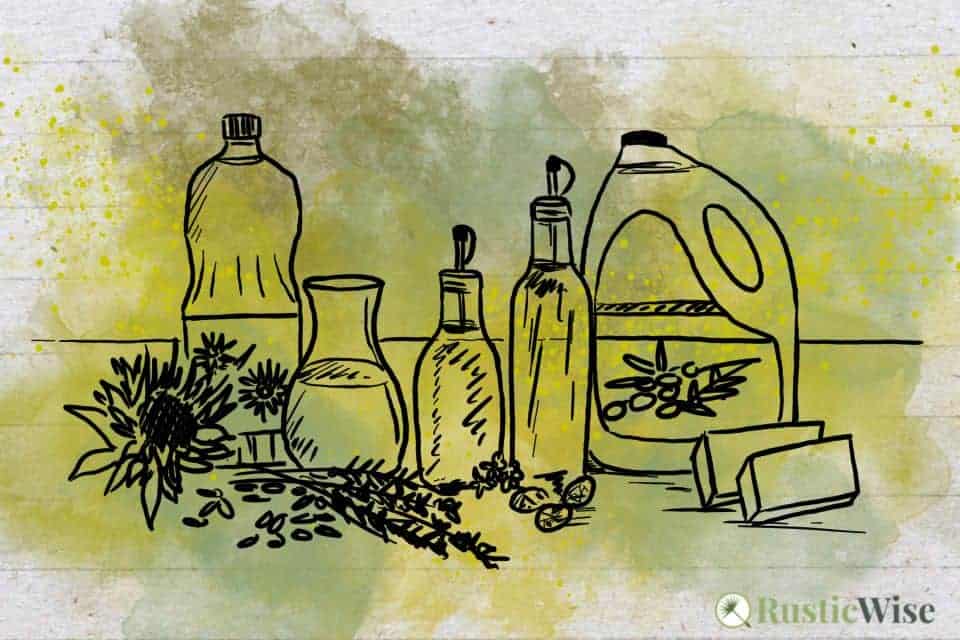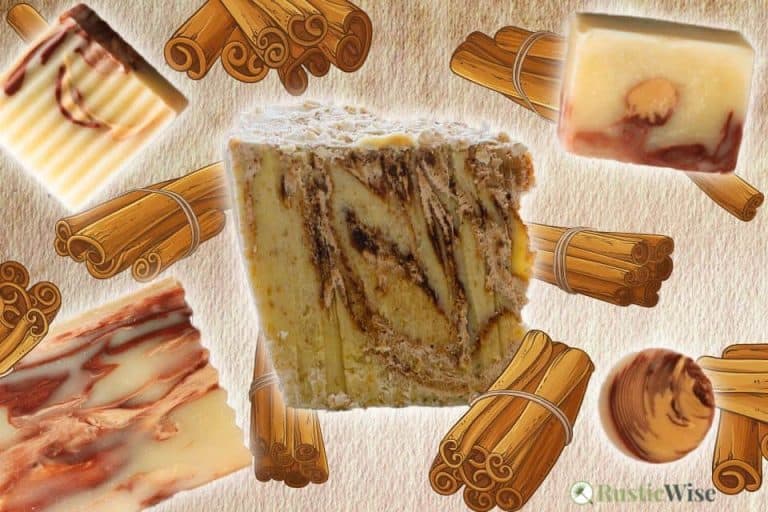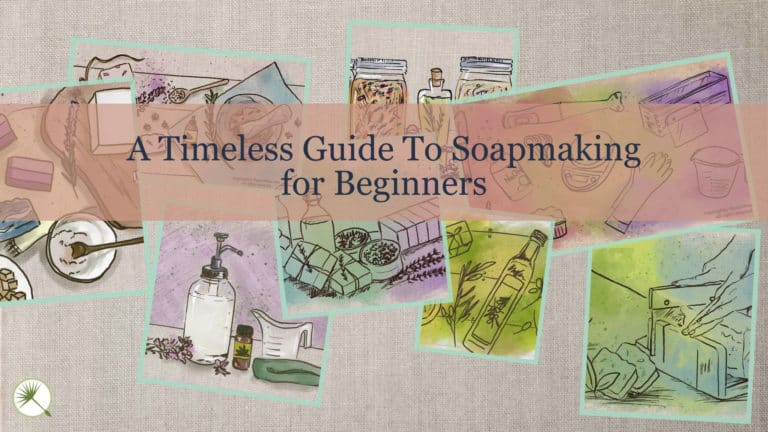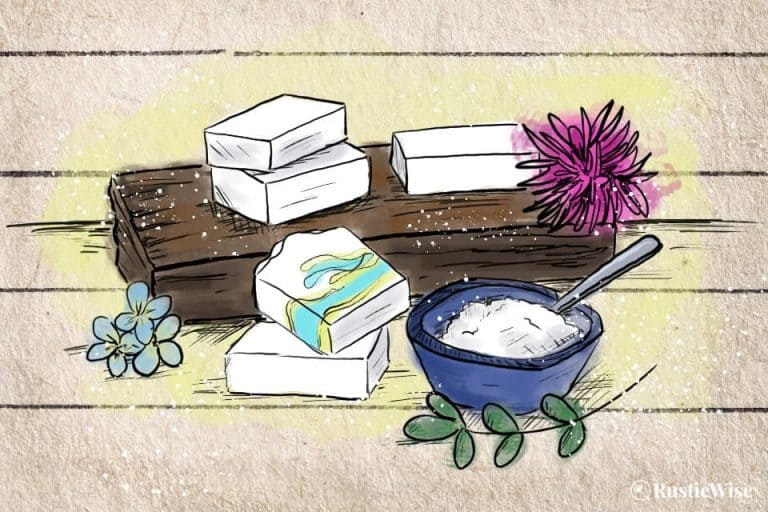A Roundup of the Best Cheap Oils for Soap Making
RusticWise is supported by its readers. When you purchase through links on our site, we may earn an affiliate commission. As an Amazon Associate, we earn from qualifying purchases. Thank You!
If you’re making homemade soap on a budget, the types (and prices) of oils used can have a huge impact on your bottom line. The good news is that there are many cheap oils for soap making that still make good soap. A few budget-friendly oils are canola oil, coconut oil, castor oil, olive oil (pomace), palm oil, rice bran oil, soybean oil, and sunflower oil. And, if you have access to lard or tallow from your own animals, this is the cheapest option!
Besides the price of your base oils, there are other ways to save money when crafting your next batch of soap. Read on to learn more about economical soap making oils, their properties, and ways to save money.
Money-saving tip to get cheap lard or tallow
I know, I know—not everyone is okay with using animal-based fats like lard or tallow. But if you are comfortable with this, you should know that lard or tallow make good bars of soap! It is, after all, what homesteaders have been using to make their own soaps for generations.
If you have access to your own beef or lard, you’re golden. You have your own source of free (or nearly free) fat for soap making.
But if you don’t have your own animals, the next best way to get cheap oils for soap making is to reach out to a local butcher. Most butchers toss fat and trimmings away as they have little use for them.
What a great way to divert waste from the landfill and make something useful in the process.
You’ll still need to render (melt and strain) the fat yourself, but this is simpler than it sounds.
Sometimes you can find lard at larger grocery stores. It often comes in large tubs in the meat section, or sometimes in the cooking oils section.
You can make soap out of 100 percent lard or tallow, but it works best when mixed with another vegetable oil at 50 percent, say, coconut oil.
Note: A common question many people have is, are lard and tallow the same thing? No, they aren’t. While both are fats from animals, lard comes from pork, more specifically the fat around internal organs such as the kidneys. Tallow comes from grazing animals such as cows. You can also render tallow from deer, goat, and sheep. Beef tallow makes slightly harder bars of soap than lard.¹
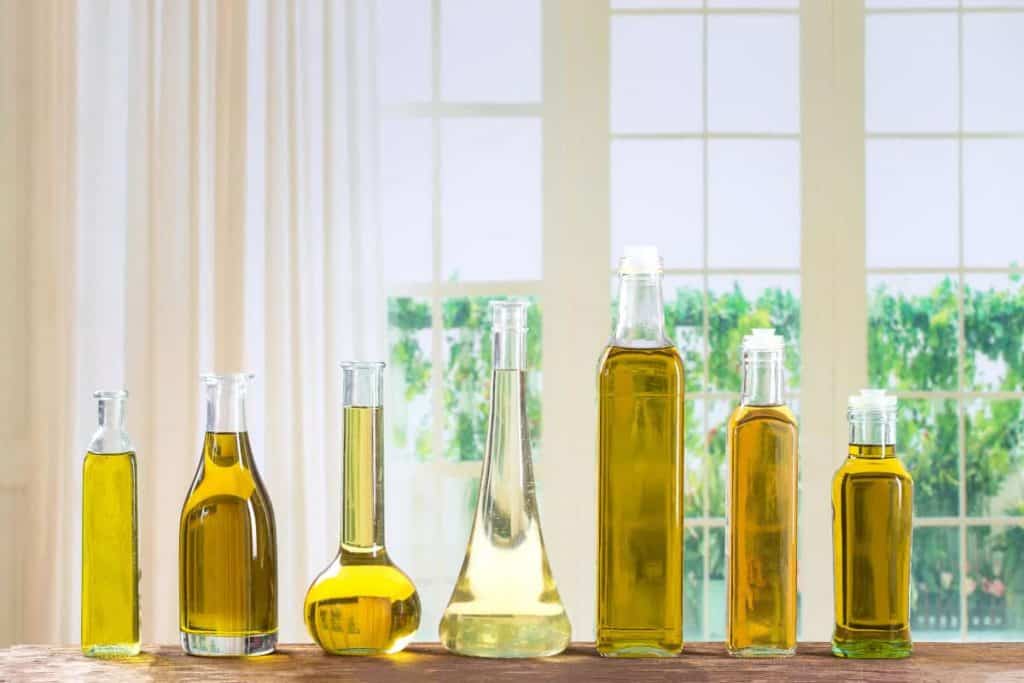
A roundup of cheap oils for soap making
If you’re new to soap making, it’s understandable if you don’t want to splurge on fancy or exotic oils. The great thing is that you can still make quality soap using inexpensive base oils.
If you could gather maybe three or four different fats or oils for making soap, a few good choices would be coconut oil, olive oil, castor oil, and palm oil. You can also make 100 percent pure tallow or lard soaps, but often you’ll find the texture is better when mixed with a vegetable oil like coconut oil.
There are many factors that affect how much money you’ll need to spend on oils for soap batches:
- Buying in bulk saves money, but only makes sense if you’re able to use up the oil.
- Whether you can buy supplies locally, or online (in which case you’ll sometimes need to pay for shipping).
- Whether you take advantage of sales.
- The grade of oil you buy. For example, pomace olive oil is a lower grade that’s perfectly suitable for making nice soap. Higher grades of refined olive oil cost more, and also alter the finished soap.
- Your location. In my neck-of-the-woods, canola oil is dirt-cheap, while it may cost more in other areas.
While prices can vary widely based on these above factors, I decided to look up a few prices on the cheapest oils for soap making on a popular soap supplier website, Wholesale Supplies Plus.
I know that prices change all the time, which is why I’ve rounded to the nearest dollar to give you a rough idea of how much you can expect to pay per pound. All pricing is in US dollars.
Cheapest Oils for Soap Making Chart
| Oil | Approximate Price (US dollars) Per Pound |
|---|---|
| Rice bran oil | Under $5 |
| Palm oil | Under $5 |
| Palm kernel flakes | Under $5 |
| Sunflower oil | Just over $5 |
| Coconut oil (76 degree) | Under $6 |
| Castor oil | Under $6 |
| Olive oil (pomace) | Just over $6 (compare this to Refined A Olive oil which costs over $8) |
| Soybean oil | Just over $6 |
| Canola oil | Under $7 |
On this website, the cheapest oils are rice bran oil, palm oil, and palm kernel flakes—all costing less than $5/pound.
Of course, the price isn’t the only factor when selecting a type of vegetable oil to use for making soap—the soap making qualities of each oil also play a huge role.²
Rice bran oil
Packed with vitamin E, refined rice bran oil provides a rich moisturizing and conditioning boost to soap. It also absorbs nicely into skin. Rice bran oil has similar properties as olive oil in soap: it provides low creamy lather. Use between 6 and 12 percent in your soap recipe.
Palm oil
One of the most popular soap making oils, palm oil provides big bubbly lather and makes hard bars of soap (especially when paired with coconut oil). It’s also rich in vitamin E. Look for an ethically sourced brand (RSPO-certified). We consider palm a hard oil as it’s solid at room temperature. Palm oil is extracted from the fruit of the palm tree. Use between 25 and 50 percent of palm in your oils.
Palm kernel flakes
Palm kernel oil (or flakes) are considered a brittle oil which means they are very hard. PKO is great for boosting lather and creating hard soaps. PKO is extracted from the seed of the fruit. Use up to 15 percent in cold or hot process recipes. When used in higher quantities, PKO speeds up trace.
You might like
Palm Kernel Oil Flakes for Soap, Organic Pure Unrefined
- Comes in flake form which is easy to measure.
- Loaded in Vitamins A, K and antioxidants.
- Palm Kernel Oil makes a very hard, bar of soap that boosts lather.
- Palm kernel oil for hair is a great treatment option for dry, dull, flat or thinning hair.
Found on Amazon
Check Current Price
Those in Canada and the UK should be taken to the product listing in your region.
Sunflower oil
Sunflower oil is also available in high oleic sunflower oil. This affordable soap making oil adds conditioning properties to soap and is rich in vitamin E. Avoid using too much as it can leave a greasy feeling. Use between 15 and 20 percent in cold or hot process soaps. Sunflower oil has a shorter shelf life of less than 1 year.
Coconut oil (76 degree)
A super-effective cleanser, coconut oil also adds hardness to soap. It provides a fluffy lather, too. While you can use up to 100 percent coconut oil in soaps, it can be over-drying. Use less than 50 to 60 percent of your oils. If you have dry skin, keep it less than 30 percent.
Castor oil
Great at adding luxurious lather to soap, it’s also highly conditioning and creamy. Avoid using too much as it may create a sticky texture in soap. Use between 20 and 25 percent of castor oil in your soap recipe.
Olive oil (pomace)
While there are many grades of olive oil, pomace is at the lower end. But this grade still makes perfectly good mild soap. Pomace oil is also much more affordable than higher grades.
Pomace-grade olive oil is derived from the pressed fruit paste of olives. It makes for slightly harder soap than refined olive oils and also lends a slight greenish color. While you can use 100 percent (Castile soap), aim to use between 10 and 30 percent to avoid overly soft soap. (Soap bars made of pure olive oil are great mild soaps—you’ll just need to let them cure longer before using.)
You might like
Olive Oil – Pomace Grade – Food Grade – 1 Gallon (128 oz)
- Food-grade and all-natural.
- Adds natural nourishment and moisturizing qualities.
- Safety sealed for freshness.
- Used for cooking, cosmetics, and soap making.
Found on Amazon
Check Current Price
Those in Canada and the UK should be taken to the product listing in your region.
Soybean oil
Great for dry or damaged skin, soybean brings the moisturizing and conditioning properties! It makes a creamy lather in soap bars. You can use up to 50 percent in your recipe.
Canola oil
Often used as a substitute for olive oil, canola provides a creamy lather and great conditioning properties. Use around 15 and 20 percent in your recipe.
Other ways to save money when making soap from scratch
There are many ways to watch your pennies when crafting homemade soap.
- Avoid exotic oils: While exotic oils add a touch of luxuriousness to your bar of soap, they’re unnecessary. Exotic oils like babassu oil, mango butter, and hempseed oil can cost up to $12 per pound. Evening primrose oil comes in at a whopping $40 per pound! Stick with more affordable base oils if you’re on a budget.
- Buy in bulk: Buying in bulk saves money in the long run, especially if you’re planning on making large batches of soap. Of course, if you’re not able to use up all your oils, it’s money down the drain…
- Check for sales: Many grocery stores have weekly sales if you keep your eyes open. Costco often is a good place to pick up a large bottle of olive oil and sometimes coconut oil.
- Get creative with supplies: You can scrounge up some gently used blenders, saucepans, utensils, and crock pots if you buy secondhand ones. You can also repurpose old containers to use as soap molds.
The final word on cheap oils for soap making
If you’re wondering what the most economical oils for making soap are, it would be lard or tallow (if you have access to this). Otherwise, other cheap vegetable oils are canola oil, coconut oil, castor oil, olive oil (pomace), palm oil, rice bran oil, soybean oil, and sunflower oil. With a bit of ingenuity, there are many ways you can make quality soap without spending loads of money.
Besides focusing on the price, keep in mind that each oil or fat has unique properties that affect the finished bar of soap.
Related questions
What can I use instead of lard for soap making?
We often use palm oil as a plant-based alternative to lard (or tallow). It provides many of the same qualities as lard: it adds hardness and provides a creamy lather. Remember to run your final recipe through a lye calculator first when making a substitution!
Can I use coconut cooking oil for soap making?
Coconut oil is a great choice for soap making because it produces a very hard bar that has a rich lather. Most store-bought cooking coconut oils are 76 degree.
When selecting a coconut oil for soap making, there are unrefined and refined varieties. Unrefined is sometimes called cold-pressed and has undergone minimal processing; this type of coconut oil has a strong coconut smell (which may or may not be your cup of tea). Refined coconut oil has been further processed and has the scent removed.
Both are fine for soap making; however most soapers use refined as it is scent-free.

References
- Emery, Carla (2012). The Encyclopedia of Country Living, 40th Anniversary Edition. Sasquatch Books. pp. 635–636. ISBN-13: 978-1-57061-840-6.
- Grosso, Alicia (2016). DIY Artisanal Soaps: Make Your Own Custom Handcrafted Soaps! Adams Media. pp. ISBN 978-1-4405-9408-3.

Author: Josh Tesolin
Josh is co-founder of RusticWise. When he’s not tinkering in the garden, or fixing something around the house, you can find him working on a vast array of random side projects.

